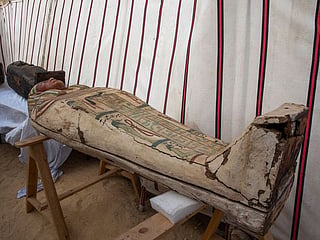Golden-tongued Egyptian mummies discovered near Alexandria
They are from around 2,000 years ago

Cairo: An Egyptian-Dominican archaeological mission working near Alexandria has discovered mummies from around 2,000 years ago bearing golden-tongued amulets, the Egyptian authorities told AFP on Wednesday.
"The mission discovered 16 tombs cut into the rock... in the temple of Taposiris Magna, west of Alexandria" in northern Egypt, the antiquities ministry said in a statement, adding that the burial technique was widespread in the Greek and Roman periods.
The tombs contained several mummies that were "poorly preserved" but bore "gold-leafed amulets in the shape of a tongue".
The amulets were placed in the mouths of the dead "to ensure they could speak in the afterlife", according to the ministry.
Two of the mummies were of particular interest to the researchers, mission chief Kathleen Martinez was quoted as saying in the statement.
'Bandages and cardboard'
AFP was not able to immediately reach Martinez for comment on Wednesday.
The team also found a female burial mask, a golden diadem and eight sculpted marble masks, according to Khaled Abu al-Hamd, head of Alexandria Antiquities.
The mission has been working to the west of Alexandria for several years, searching for the tomb of the legendary Ptolemaic Queen Cleopatra - though doubts remain among archaeological circles about the likelihood of finding it in the area.
The Ptolemaic dynasty was of Greek origin and ruled Egypt between 323 and 30 BC.
It was the last pharaonic dynasty before Egypt came under Roman rule, and Cleopatra was its last sovereign.
Sign up for the Daily Briefing
Get the latest news and updates straight to your inbox







